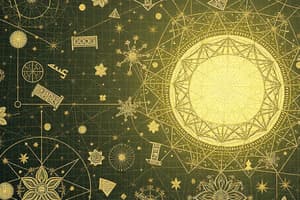Podcast
Questions and Answers
What is the branch of mathematics that deals with the study of shapes, sizes, and positions of objects?
What is the branch of mathematics that deals with the study of shapes, sizes, and positions of objects?
- Geometry (correct)
- Number Theory
- Calculus
- Algebra
What is the term for collections of unique objects used to define mathematical structures and operations?
What is the term for collections of unique objects used to define mathematical structures and operations?
- Functions
- Axioms
- Proofs
- Sets (correct)
Who is the ancient Greek mathematician who wrote the influential work 'Elements'?
Who is the ancient Greek mathematician who wrote the influential work 'Elements'?
- Archimedes
- Euclid (correct)
- Isaac Newton
- Pierre-Simon Laplace
What is the branch of mathematics that deals with the study of variables and their relationships?
What is the branch of mathematics that deals with the study of variables and their relationships?
What is the term for logical arguments used to establish the truth of mathematical statements?
What is the term for logical arguments used to establish the truth of mathematical statements?
What is the mathematical operation that involves combining two or more numbers to get a total or sum?
What is the mathematical operation that involves combining two or more numbers to get a total or sum?
Who is the German mathematician who developed set theory and introduced the concept of infinity?
Who is the German mathematician who developed set theory and introduced the concept of infinity?
What is the branch of mathematics that deals with the study of properties of integers and other whole numbers?
What is the branch of mathematics that deals with the study of properties of integers and other whole numbers?
Flashcards are hidden until you start studying
Study Notes
Branches of Mathematics
- Arithmetic: Study of numbers and their operations (e.g. addition, subtraction, multiplication, division)
- Algebra: Study of variables and their relationships (e.g. equations, functions, graphing)
- Geometry: Study of shapes, sizes, and positions of objects (e.g. points, lines, angles, solids)
- Calculus: Study of change and motion (e.g. limits, derivatives, integrals)
- Number Theory: Study of properties of integers and other whole numbers (e.g. prime numbers, congruences)
- Combinatorics: Study of counting and arranging objects in different ways (e.g. permutations, combinations)
- Topology: Study of properties of shapes and spaces that are preserved under continuous deformations (e.g. connectedness, compactness)
Key Concepts
- Sets: Collections of unique objects, used to define mathematical structures and operations
- Functions: Relations between sets, where each input corresponds to exactly one output
- Proofs: Logical arguments used to establish the truth of mathematical statements
- Axioms: Self-evident truths used as the foundation for mathematical theories
- Theorems: Mathematical statements proven to be true using axioms and previously proven theorems
Mathematical Operations
- Addition: Combining two or more numbers to get a total or sum
- Subtraction: Finding the difference between two numbers
- Multiplication: Repeating a number a certain number of times to get a product
- Division: Splitting a number into equal parts or groups
- Exponents: Raising a number to a power, indicating repeated multiplication
- Roots: Finding the number that, when multiplied by itself, gives a specified value
Important Mathematicians
- Euclid: Ancient Greek mathematician who wrote the "Elements," one of the most influential works in the history of mathematics
- Isaac Newton: English mathematician and physicist who developed calculus and laws of motion
- Archimedes: Ancient Greek mathematician and engineer who made significant contributions to the field of geometry
- Pierre-Simon Laplace: French mathematician who developed probability theory and celestial mechanics
- Georg Cantor: German mathematician who developed set theory and introduced the concept of infinity
Branches of Mathematics
- Arithmetic studies numbers and their operations, including addition, subtraction, multiplication, and division.
- Algebra focuses on variables and their relationships, including equations, functions, and graphing.
- Geometry examines shapes, sizes, and positions of objects, including points, lines, angles, and solids.
- Calculus explores change and motion, including limits, derivatives, and integrals.
- Number Theory investigates properties of integers and other whole numbers, including prime numbers and congruences.
- Combinatorics deals with counting and arranging objects in different ways, including permutations and combinations.
- Topology studies properties of shapes and spaces preserved under continuous deformations, including connectedness and compactness.
Key Concepts
- A set is a collection of unique objects used to define mathematical structures and operations.
- A function is a relation between sets, where each input corresponds to exactly one output.
- Proofs are logical arguments used to establish the truth of mathematical statements.
- Axioms are self-evident truths used as the foundation for mathematical theories.
- Theorems are mathematical statements proven to be true using axioms and previously proven theorems.
Mathematical Operations
- Addition combines two or more numbers to get a total or sum.
- Subtraction finds the difference between two numbers.
- Multiplication repeats a number a certain number of times to get a product.
- Division splits a number into equal parts or groups.
- Exponents raise a number to a power, indicating repeated multiplication.
- Roots find the number that, when multiplied by itself, gives a specified value.
Important Mathematicians
- Euclid wrote the "Elements," a foundational work in mathematics.
- Isaac Newton developed calculus and laws of motion.
- Archimedes made significant contributions to geometry and engineering.
- Pierre-Simon Laplace developed probability theory and celestial mechanics.
- Georg Cantor developed set theory and introduced the concept of infinity.
Studying That Suits You
Use AI to generate personalized quizzes and flashcards to suit your learning preferences.




